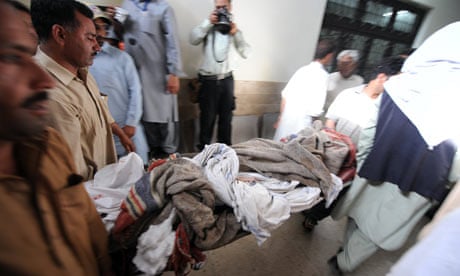A suicide blast ripped through a crowd outside a Shia mosque south of Islamabad today, killing at least 22 people and wounding many more.
The explosion, in Chakwal, 50 miles from the capital, happened as the country reeled from a weekend of renewed Taliban violence.
It came less than a day after a presumed Taliban suicide bombing in Islamabad killed six paramilitary soldiers and two civilians.
A teenage male, dressed in black, tried to force his way through a crowd of about 2,000 people gathered outside an Imambargah, or Shia place of worship, in Chakwal for an annual religious festival.
After security guards challenged him at the gates, he blew himself up, Ayaz Amir, a local MP who was speaking by phone from a local hospital, said.
The blast left body parts and charred flesh scattered across a yard outside the mosque building.
The Pakistani president, Asif Ali Zardari, ordered the interior ministry to send three helicopters to Chakwal to assist the seriously wounded.
There was no claim of responsibility, but Amir blamed the Taliban. "This is very serious," he said. "Now the war is coming to Punjab."
Taliban and sectarian violence in Pakistan are becoming increasingly interlinked.
Militants from sectarian groups such as Sipa Sahaba, which targets Shias and is rooted in Punjab, have become closely allied with al-Qaida and Taliban militants based in the federally administered tribal areas.
Eighteen months ago, Baitullah Mehsud, the leader of the largest Taliban group in Pakistan, had three Shia soldiers beheaded.
He was later blamed for the assassination of the former prime minister Benazir Bhutto, also a Shia.
"It would be wrong to call this a sectarian blast," Amir said.
"That would mean rival sects playing it out against each other. But this is a Taliban terrorist attack."
Violence once confined to the north-west frontier province is spreading deeper into Pakistan.
The suicide bombing in Islamabad last night was the second attack on security forces in the capital in a fortnight.
On 23 March, a bomber attacked a police station in the city.
The attacker struck after dark, sneaking into a roadside camp occupied by paramilitary soldiers in the upmarket E7 neighbourhood – inhabited by ministers, diplomats and senior civil servants – before blowing himself up. Eight people died.
Two others attackers fled the scene, firing guns, according to reports. Businesses closed early, giving the city a deserted look.
Last week, Mehsud claimed responsibility for an eight-hour assault on a police training centre in Lahore in which eight cadets and at least four militants were killed.
Meanwhile, the tempo of violence in the ungoverned tribal belt continued to rise over the weekend.
Early yesterday morning, a presumed US drone fired missiles at a militant hideout in North Waziristan. At least 13 people, including some foreign militants, were killed.
Hours later, a suicide bomber crashed an explosives-filled car into a nearby military checkpost in an apparent retaliation attack, killing at least 17 people including five children.
In another incident, police in the western Baluchistan province discovered 50 dead bodies and about 60 unconscious Afghans inside a truck container that had crossed the Afghan border.
The victims, mostly of Uzbek, Tajik and Hazara origin, had suffocated. They were trying to travel to Europe illegally via Iran.
John Solecki, a UN official who was freed on Saturday night after two months in captivity at the hands of Baluch rebels, was flown out of Pakistan.
Solecki, who works for the UN high commissioner for refugees, was found lying on the roadside with his hands and feet bound, the man who discovered him told the Associated Press.
